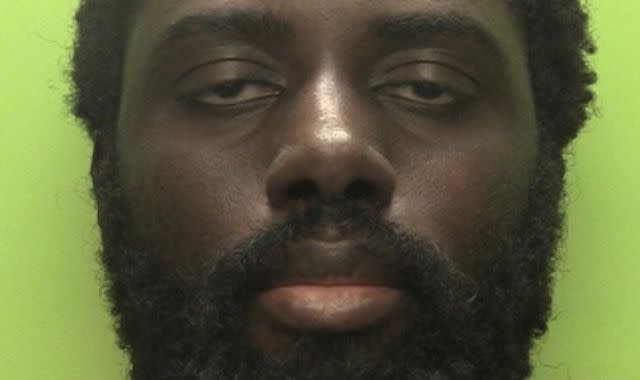Man who stabbed three people to death in Nottingham 'felt pressure' from voices in his head to kill people, court hears

A man who stabbed three people to death in Nottingham heard voices in his head telling him he needed to kill people otherwise something "atrocious" would happen to his family, a court heard.
Valdo Calocane also once visited MI5's London headquarters to ask them to stop "controlling him", Nottingham Crown Court was told on Wednesday.
The 32-year-old was suffering from paranoid schizophrenia when he stabbed students Barnaby Webber and Grace O'Malley-Kumar, both 19, and school caretaker Ian Coates, 65, in Nottingham in the early hours of 13 June 2023.
Calocane has admitted three counts of manslaughter and three of attempted murder after hitting three other pedestrians with a van he stole from Mr Coates.
Psychiatrists discussed Calocane's mental state on Wednesday, with one telling the packed court the defendant heard voices telling him he needed to kill people or his family would be hurt.
Dr Leo McSweeney, a consultant psychiatrist, said Calocane "felt pressure" to kill people otherwise something "atrocious" would happen to his family.
Describing their first meeting in November, he said: "He explained he had experienced pressure, voice and persecutory beliefs.
"He gave some explanation for what happened, said this pressure had reached a certain point and if he did not act in a certain way, something atrocious would happen to his family.
"He appreciated his actions would mean he would likely end up in prison, recognising they were wrong.
"He certainly implied he felt impelled to cause vast amounts of harm."
Dr Nigel Blackwood, professor of forensic psychiatry at King's College London, told the court Calocane has shown a "profound lack of awareness" of his serious mental health condition, which he will have "until his dying day".
Dr Blackwood said of the period leading up to the killings: "He continued to believe that this was not, in his words, a natural illness, but that he was subject to interference by malign forces.
"He concealed symptoms from his (mental health) team, he evaded their care and he did not trust them."
Asked if Calocane still hears voices, Dr Blackwood said: "I understand that they have reduced in intensity and frequency... but they are still there."
Dr Blackwood also said Calocane was in the "grip of a severe psychotic episode" during the attacks, saying: "As a result, he has lost sight of others' humanity and their right to life - he is entirely driven by the psychotic process at the time.
"The assaults would not have occurred in the absence of his psychosis."
Read more:
Nottingham attack victim tried to save friend
Victims' families described 'crippling grief'
Father of victim delivers poignant eulogy
Despite his paranoid schizophrenia, which caused an "abnormality of mental function", Dr Blackwood said Calocane knew at the time that what he was doing was "morally and legally wrong", which led him to rule out a potential defence of insanity.
Dr Ross Mirvis, a consultant psychiatrist at Ashworth high security hospital on Merseyside, where Calocane is a patient, agreed with Dr Blackwood and Dr McSweeney that Calocane would not have killed if he was not suffering from paranoid schizophrenia.
All three psychiatrists have suggested a hospital order would be the best sentence for Calocane.
Prosecutor Karim Khalil KC said Calocane "knew what he was about to do" as he prepared to attack Mr Webber and Ms O'Malley-Kumar from behind as they walked to their student accommodation after a night out.
Mr Khalil said: "He hid, as we know, in the shadows.
"What he did was wait in the shadows until the two students walked past and he followed them from behind. He attacked them from behind when they were at their most vulnerable.
"He plainly knew what he was about to do."
Before stabbing Mr Coates, Mr Khalil said, Calocane lured him from his vehicle.
"It is plain he conducted himself in a purposeful way," Mr Khalil added.
"It is clear that his dangerousness is heightened by virtue of his ability to diminish or conceal that which he is actually doing."
Calocane asks MI5 to 'stop controlling him'
Meanwhile, Calocane's barrister Peter Joyce KC told the court the defendant described hearing male and female voices, which would give him direct instructions and threaten him and tell him to harm hospital staff.
He said: "(These voices) said people he loved would be harmed.
"He had been to his family home in another part of the country which involved a long journey, arrived there and waited outside all day, fearful.
"His family had come home, but he had refused to go into the house with them because he had gone there to warn them.
"He said those who were controlling his head were controlling his eyes and could see where in the house his mother, father and brother were sitting so they could be targeted.
"He didn't go in at all but stayed all night in the car outside to protect them."
Mr Joyce also told the court Calcocane once tried to surrender to MI5 at their headquarters to try and stop them controlling him.
He continued: "That's not a concoction by (Calcocane).
"There is a photograph taken by their systems at Thames House, saying 'please arrest me' - effectively 'stop controlling me'."
Mr Joyce said the incident happened on 31 May 2021, about two years before the "desperate episode" in which he killed three people on the streets of Nottingham.
The court was also told Calocane believed he was controlled by radio and sonic control, subjects he studied during his degree course at Nottingham University.

 Yahoo News
Yahoo News 
